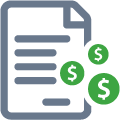Note: The information in this blog is for educational purposes only and should not be used or construed as financial or investment advice by any individual. Information obtained from third parties is believed to be reliable, but no representations or warranty, expressed or implied, is made by Questrade, Inc., its affiliates or any other person to its accuracy.
Lesson Inflation & interest
Inflation and interest rates
See how inflation and interest rate risk can affect you.
A steady and consistent rate of inflation may be beneficial to an economy. It can stimulate more spending, grow businesses, and provide employment. On the other hand, a higher than average inflation may be detrimental to an economy which can lead to less buying, lower business profits, and a higher unemployment rate.
To maintain a stable economy, the central bank (or Bank of Canada) targets and tries to maintain the inflation rate to 2% each year. In addition, the central bank also adjusts its interest rate to ensure that inflation is maintained. You’ve probably heard it before in the news when the Bank of Canada increased or lowered their “interest rate”. This interest rate is called the policy rate which commercial financial institutions use when borrowing funds from the central bank. The policy rate affects how financial institutions set their own interest rates - the interest rates consumers see - for mortgages and other consumer loans such as line of credit, car loans, and business loans. In this way, the central bank is able to regulate and maintain the inflation rate in the economy.
For example, when inflation is high, the central bank tends to increase the short-term interest rate to lower it. As interest rates increase, confidence in consumer spending decreases since it’s more expensive to loan and the future can be uncertain for many. People typically tend to be more conservative on their purchases and save money instead. This lowers demand and business profits which in the end can slow down (or lower) inflation.
In contrast, if inflation is low, central banks can set the interest rate low to stimulate the economy. When interest rates are low, it encourages more spending and drives more business profits. The demand for goods and services tends to go up prompting prices to go up as well. As a result, inflation tends to go up.
Interest rates and inflation work sideways in any economy and typically have an inverse relationship.
Effects of inflation on investments
As inflation can increase, it can also affect investments depending on their asset class. Typically, inflation can present lower than expected returns to fixed-income assets and may have a mixed impact on equity investments. Let’s take a look at each one.
Fixed-income investments

Inflation can affect the value of fixed-income assets when it triggers an increase in interest rates. When inflation is higher than normal for example, governments and companies may also have to increase their interest rates on their new bond issues. When this happens, your existing bond’s value declines (despite its face value) in the market due to the current bond having a higher rate. People are more likely to buy the new bonds with higher coupon rates and your existing bond will be less competitive in the market. If you were to sell your existing bond before the maturity date, you may have to sell it at a discount.
In addition, inflation may lower the “real” value of fixed income asset returns. This happens because of the difference between the nominal returns (what bond issuers show on “paper”) versus the overall effective returns adjusted with the inflation rate. For a hypothetical example, let's say you invested in a short-term bond with a yield of 4% at $100. After a year, the value of that investment becomes $104 with the 4% interest return. However, inflation continues to rise at a 2% rate reducing the purchasing power of your effective returns. On paper, your investment increased by 4% but the actual return is only 2% (or $102) due to the 2% inflation.
Equity investments
Inflation may cause a mixed impact on equity investments such as stocks. In theory, incremental inflation (due to a strong and growing economy) may increase companies’ revenue and earnings, increasing their share value. However, it may also be the case that inflation ramps up production costs (such as raw materials and wages) which may hurt the revenues of a company. It’s hard to tell how inflation can exactly affect stocks but it’ll also depend on how companies will perform in an inflationary environment.
Since inflation can affect different asset classes, diversifying your portfolio to different types of investments can be an option to reduce lower than expected returns.
Related lessons
Want to dive deeper?
Understanding inflation
Find out what inflation means for the market and how it can affect you.
View lessonRead next
Investing foundations
Understand the fundamentals and major concepts in investing to help you build a solid investing foundation.
View lessonExplore
How to set up financial goals
Discover financial goal setting and how it can impact your investments.
View lesson